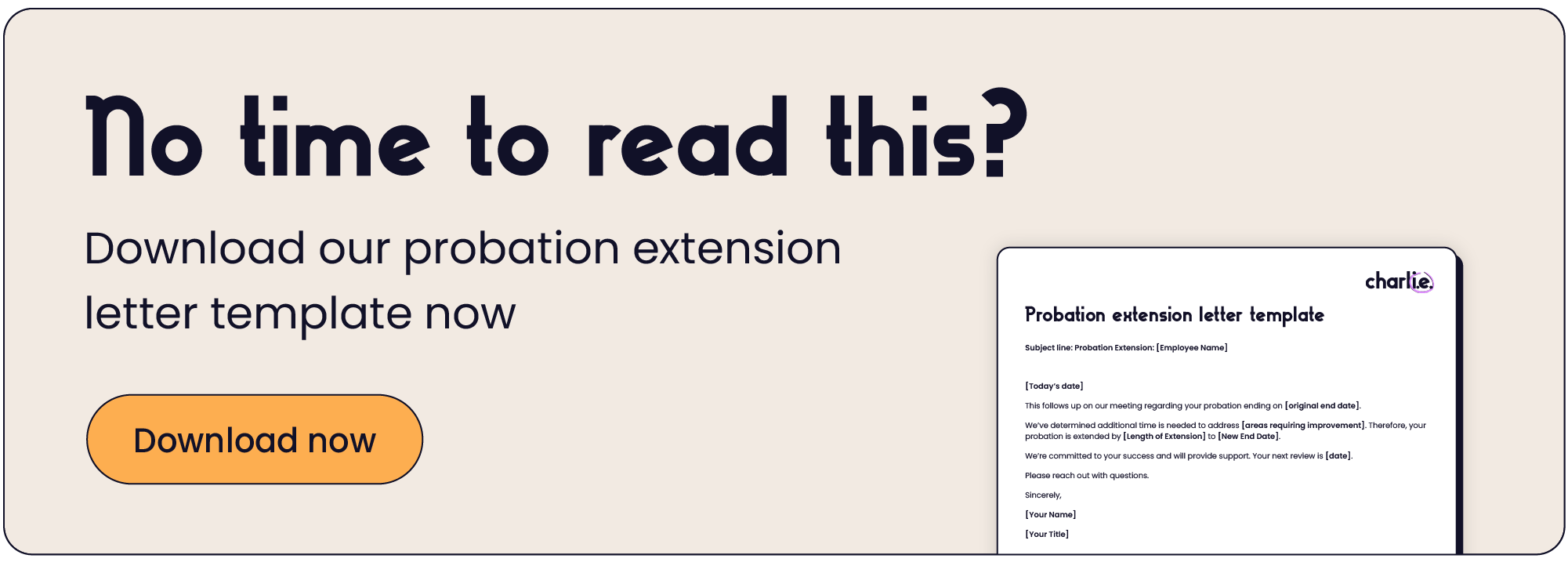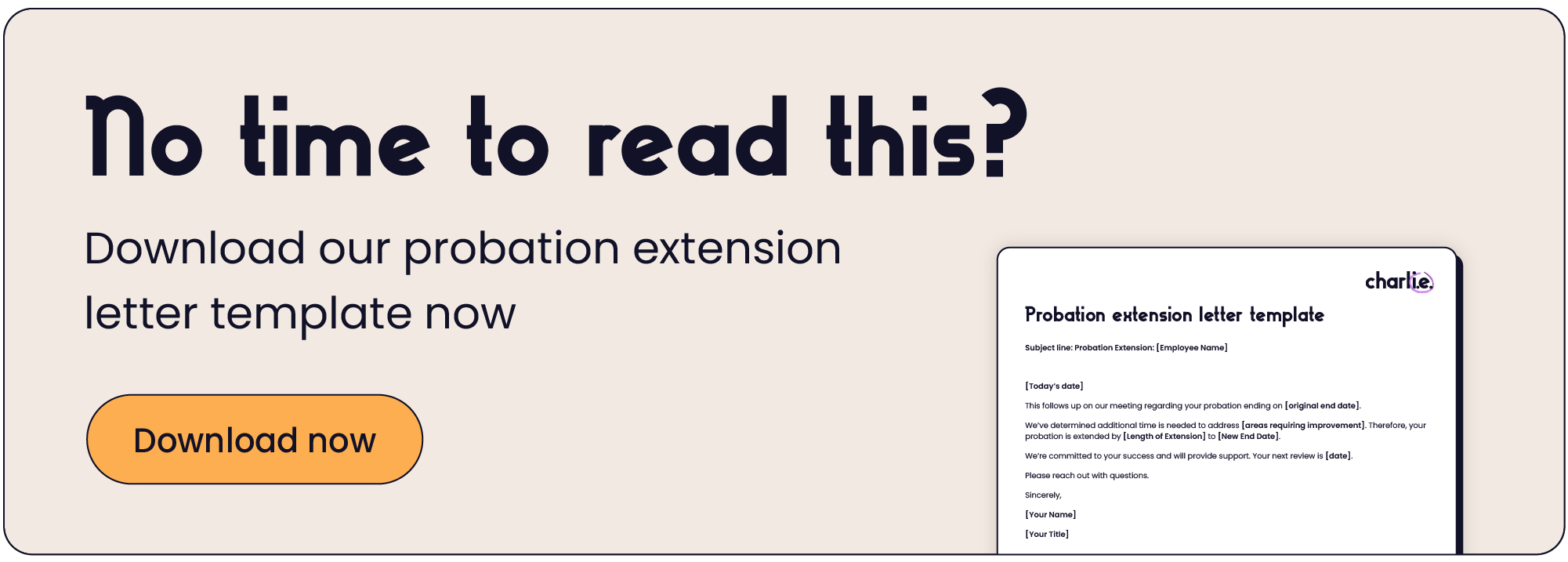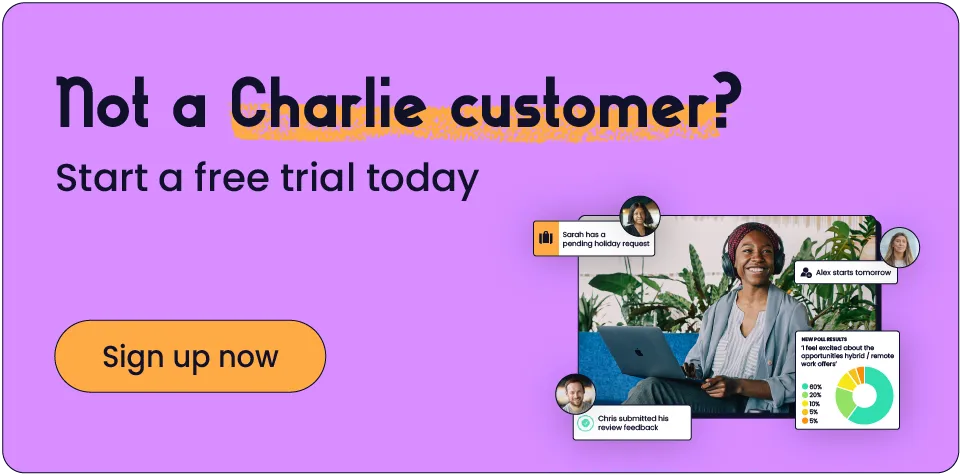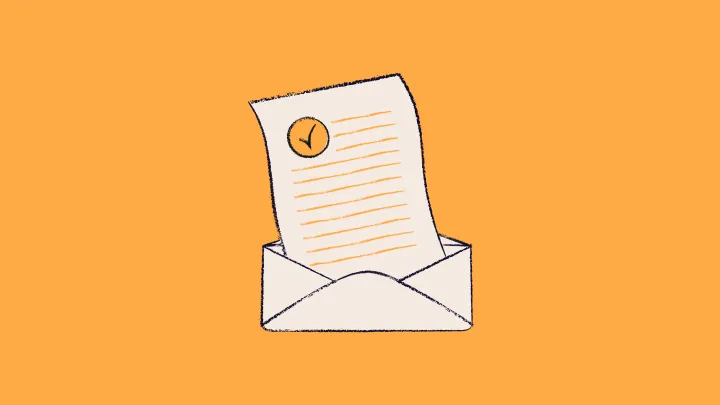The complete guide to extending probation period (With free letter template included)

Probation periods are crucial for ensuring a good fit between a new hire and the company. They allow you to assess skills, work ethic, and cultural fit. But what happens if the initial time frame isn't enough to make a clear call?
Here at Charlie, we understand that building a strong team takes time and careful evaluation. In this guide, we'll equip HR leaders and managers with the knowledge and resources needed to effectively extend a probation period.
I'll walk you through the steps involved, from identifying the need for an extension to crafting clear and professional communication with the employee. I've also included a free letter template to streamline the process.
What is a probation period?
Probation is a period when a new hire is being tested before getting a permanent job. This goes both ways:
- Employees are provided with the opportunity to familiarise themselves with the job and determine if it's a good fit for them
- Employers also to test if the employee's fit for the role before making a long-term commitment.
Although not mandatory or required by any law, the probation period is a widespread practice implemented by many HR departments. It's considered a best practice in human resources to have a probationary period for new hires, but the duration and specific policies surrounding it can vary from company to company.
For example, at Charlie, our new hires undergo a three-month probation period This allows us to assess this individual's fit for our company and evaluate their performance during the first three months of employment.
We personally think it’s a good idea and gives us enough time to evaluate new hires, and if the new hire successfully completes the probation period and is deemed fit for the role, they typically transition into regular employment status.
This means they continue working under the terms outlined in their employment contract, often with access to benefits such as paid time off, healthcare, and other perks offered by the company.
Essential components of a successful probation period
When it comes to implementing a probation period in your organisation, you must consider the following factors:
- Clear goals: Outline specific goals and expectations for both employer and employee. This ensures both parties understand what needs to be achieved during the probation period.
- Check-ins: Managers should set up regular meetings or review sessions with the new hires. This provides opportunities for feedback, clarification, or addressing any issues that occur during the probation period.
- Objectives: This approach focuses on creating goals that are SMART (specific, measurable, achievable, relevant, and time-bound). These SMART goals allow you to easily monitor each employee's progress and assess their performance.
- Formal review meeting: A formal review meeting at the end of the probation period allows for a comprehensive evaluation of the employee's performance against the established goals. With Charlie’s performance software, you can successfully streamline formal review meetings during probation periods, making your evaluation process and logging easier.
- Transparent communication: Open and transparent communication throughout the probation period fosters trust and ensures alignment between the employee and the employer regarding expectations and performance.
Overall, these elements contribute to a constructive probationary period that supports the employee's development and helps the organisation make informed decisions about their continued employment.
When to Consider a Probation Extension
Probation can only be extended if the manager hasn't yet decided to accept or refuse the employee, and this can be due to the following reasons:
- Performance issues: If the new hire hasn't shown signs of improvement by the end of the probation period, then you can extend their probation to give them a chance to improve. During this period, you can take the right steps to address underperformance and provide additional support and resources as needed to help the new hire succeed.
- Unforeseen circumstances: When faced with illness, personal emergencies, or other unforeseen circumstances, an employee might lack the ability to perform effectively during the probation period. Extending their probation ensures each employee's performance is reviewed fairly once the situation is resolved.
- Incomplete projects and goals: There are times when an employee might fall short on meeting deadlines and completing assigned tasks; extending their probation in this case gives them more time to accomplish these tasks.
- Attendance or conduct issues: During the probation period, an employee might display signs of unprofessionalism such as lateness, violating company policies, dishonesty, etc. In the process of probation extension, as a manager, you can address these issues and ensure they align with company standards.
Why should you extend probation?
According to research by CareerBuilder, the average cost of hiring the wrong employee is $17,00. The same survey also shows that 39% of businesses report a productivity decrease as a result of a bad hire.
Extending probation reduces the risk of a bad hiring decision – this is something we really care about at Charlie.
Think of it this way: you've invested a lot of time and resources to find the perfect hire; however, there are times when the individual fails to meet performance standards. Instead of terminating their employment, you might decide to extend the probation or put the individual on a coaching plan to help them enhance their skills.
Employees are granted more time to showcase their abilities, this gives everyone a fair chance to prove themselves. They should undergo further training and development programs to boost their knowledge and capabilities in their role.
Additionally, implementing both a performance improvement plan (PIP) and a probation review can be a comprehensive approach to support struggling employees and assess their progress effectively.
A performance improvement plan outlines specific goals, expectations, and timelines for improvement.
Conducting a probation review, on the other and, allows for a holistic evaluation of the employee's performance over an extended period. This review considers not only the progress made during the probation extension but also the overall performance throughout the probationary period. Check out our probation review template for more information.
When it comes to extending probation, I recommend that it be done within a month or three months. A month alone is a narrow frame for the individual to turn their performance around.
If they fail to meet the requirements, goals, and measurements for this role, then you might consider terminating employment. Even during probation, employees have rights against unfair dismissal. You have to ensure your reasons are fair and documented.
Legal considerations to take into account when extending probation
When it comes to implementing probation extensions in the workplace, it's crucial to adhere to legal guidelines, such as reviewing employment contracts, company policies, and labour laws, with the advice of legal counsel, to prevent any potential legal issues or liabilities.
There's no legal minimum or maximum set for a probation period; however, a typical probation period is between 3-6 months.
If you choose to extend probation, it must be specified in the employee's contract of employment. This should outline the duration and any terms around extension.
However, if it's not stated in the employment clause, you would have to seek the employee's consent to increase their probation period. The employee reserves the right to agree to or dismiss the proposal.
During this period, the employee is entitled to the following employment rights:
- The National Minimum Wage;
- The right to rest breaks and paid holidays;
- Entitlement to pay slips;
- Statutory sick pay;
- The right not to be discriminated against;
- You have the right to reasonable adjustments if you are disabled.
Additionally, the law protects the employees from wrongful dismissal. Employers cannot take illegal action against an employee during the probation period, such as termination based on race, generality, or any other characteristics.
With a trusted HR partner, you don't have to worry about staying compliant with UK employment laws and regulations. Our HR advisors will ensure your probation extensions are handled smoothly, fairly, and comply with the law, reducing the risk of potential lawsuits or wrongful termination suits.
Probation Extension Letter Template
Below, I have included a template you can use when writing a letter to an employee informing them of an extension to their probation period.
Probation extension letter template
Subject line: Probation Extension: [Employee Name]
[Today's date]
This follows up on our meeting regarding your probation ending on [original end date].
We've determined additional time is needed to address [areas requiring improvement]. Therefore, your probation is extended by [Length of Extension] to [New End Date].
We're committed to your success and will provide support. Your next review is [date].
Please reach out with questions.
Sincerely,
[Your Name]
[Your Title]
It is important to maintain a professional and respectful tone throughout the letter.
Simplify probation extensions
For small businesses and startups looking to extend probation periods smoothly, turning to technology can be a game-changer. Charlie's software is a standout option, designed with small businesses in mind. It helps track employee performance, manage probation periods, and keep communication clear between managers and staff.
Start your free 7-day trial today and discover how Charlie can optimise your HR practices.





